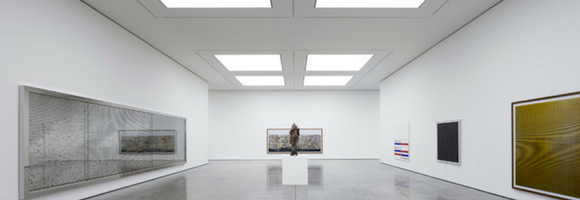Sophie Macpherson Ltd is a headhunting and recruitment firm based in London, serving prestigious arts world businesses and cultural organisations across the globe, such as White Cube, Sotheby’s, Science Ltd (Damien Hirst’s studio) and Pelham Communications. We spoke to Sophie Macpherson and her team about what it takes to make it in the arts world and the surprisingly diverse range of roles available to those with the desire and dedication to immerse themselves in this fascinating industry.
Which career areas are most popular amongst applicants?
“We get a lot of applicants for roles in artist’s studios,” said Sophie Macpherson, “such as Studio Assistant, Studio Manager or Production Assistant, for people who like to be close to the art and engaged in conversations surrounding the conception and production of art work. It is an exciting environment to see where the process begins and the art itself is created. Gallery Assistant positions are always competitive as they offer entry level candidates an overview of the gallery structure and the various career trajectories within, such as positions in sales, artist liaison, exhibitions or operations. A lot of young people straight out of university are put off by the idea of Assistant roles and tend to overlook the fact that they are an excellent opportunity to operate at the crux of an arts world business and at a senior level under the mentorship of a Director, for example.”
Is there anything new applicants can do to stand out?
“Languages are always a big plus, many of the galleries and auction houses we work with have branches in various locations globally, therefore if you speak the language it means that travel or work in another country could be a possibility. Furthermore, a large proportion of galleries’ client and collector base are international so if you speak their language it is an instant way to build a strong rapport with a client. Be tenacious, if you haven’t heard anything back from an application don’t be afraid to follow up, people are busy and it may have slipped their mind. Some of our candidates have had jobs created for them simply by going in, introducing themselves and asking if they can do an internship; being proactive and taking initiative are always to be applauded.”
What advice would you give to anyone hoping to get their foot in the door of the arts industry?
“With competition as fierce as ever, it is almost expected that you will take a few internships before being offered a full-time job. The experience can be essential to understanding the mechanisms of the industry and indeed the working world whilst building up your CV. It will also help you to learn which areas you enjoy and which you don’t, and therefore be able to run a more targeted search when applying for permanent roles. Use your summer holidays wisely and do internships and work experience in galleries and auction houses. The internship culture is here to stay and it is very rare to walk straight into a job after studying.”
Is it possible to start a career in the arts industry later in your career, or do employers look for candidates straight out of education or a previous role in the arts?
“Candidly speaking, it is harder but by no means impossible. Clients tend to look for directly relevant experience when hiring and as the arts world is so nuanced, whilst skills from other industries can be transferrable to the task at hand, there is a certain (valued) knowledge only gained from time spent in the arts world. That being said, we have seen various high profile and incredibly successful hires take place involving senior non-arts world professionals making the move to the likes of auction houses, larger galleries and well established artist studios. These candidates are able to offer a different, more corporate perspective on how an arts business could be restructured or streamlined.”
What are some of the more unusual/less -known positions in the arts industry that students or graduates may not have considered?
“There is a lot more to the arts industry than the obvious gallery, auction house and museum orientated positions,” said Sophie. “A large proportion of our roles are in arts communications (PR/Marketing) and a growing emphasis is being placed on technology, therefore the digital and social media aspect of the arts industry is fast-growing.
“As well as the typical client-facing or front of house roles that many people associate with the arts world, there are many back office and administrative roles that are equally as important, for example Registrars, who deal with the logistics of shipping, importing and exporting artworks, or Art Handlers and Technicians.
“For finance or bookkeeping roles, some galleries prefer to have people with financial backgrounds who have previously worked in a gallery context, as they will have exposure to art and deal with objects that are of much higher value than objects in other offices or businesses.”
Do you think there is enough awareness of the range of careers there are in the arts industry?
Christabel Sakkalli, Junior Consultant at Sophie Macpherson Ltd, said: “I don’t think so, before working here I had a very narrow view of what careers there were in the arts industry and it has only really been since working here that I’ve appreciated the diversity of roles there are. Going through a recruitment agency definitely helps as they have more access to a variety of roles that may not necessarily be advertised on websites or elsewhere. And I’m not just saying that because it is my job!”


